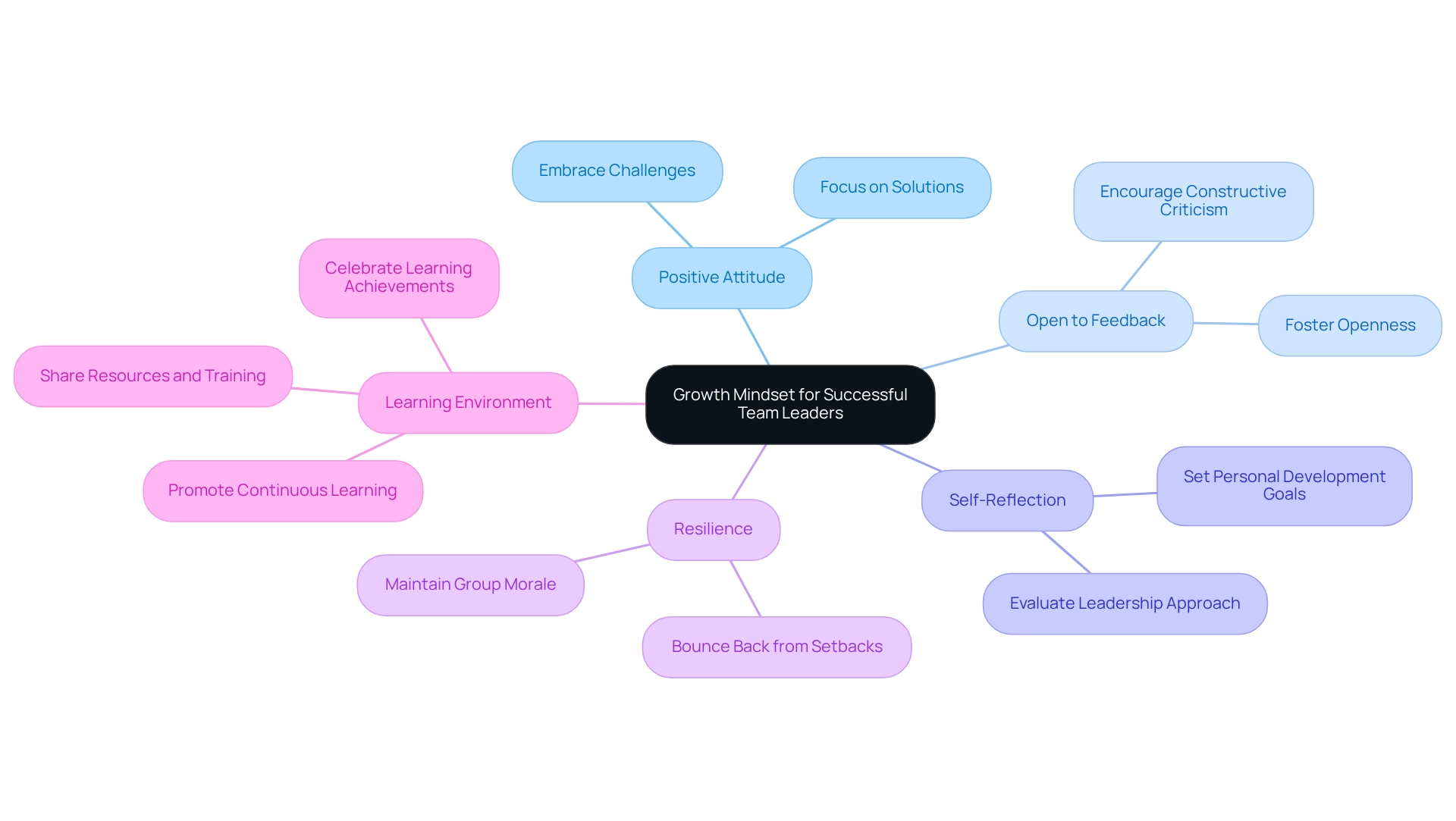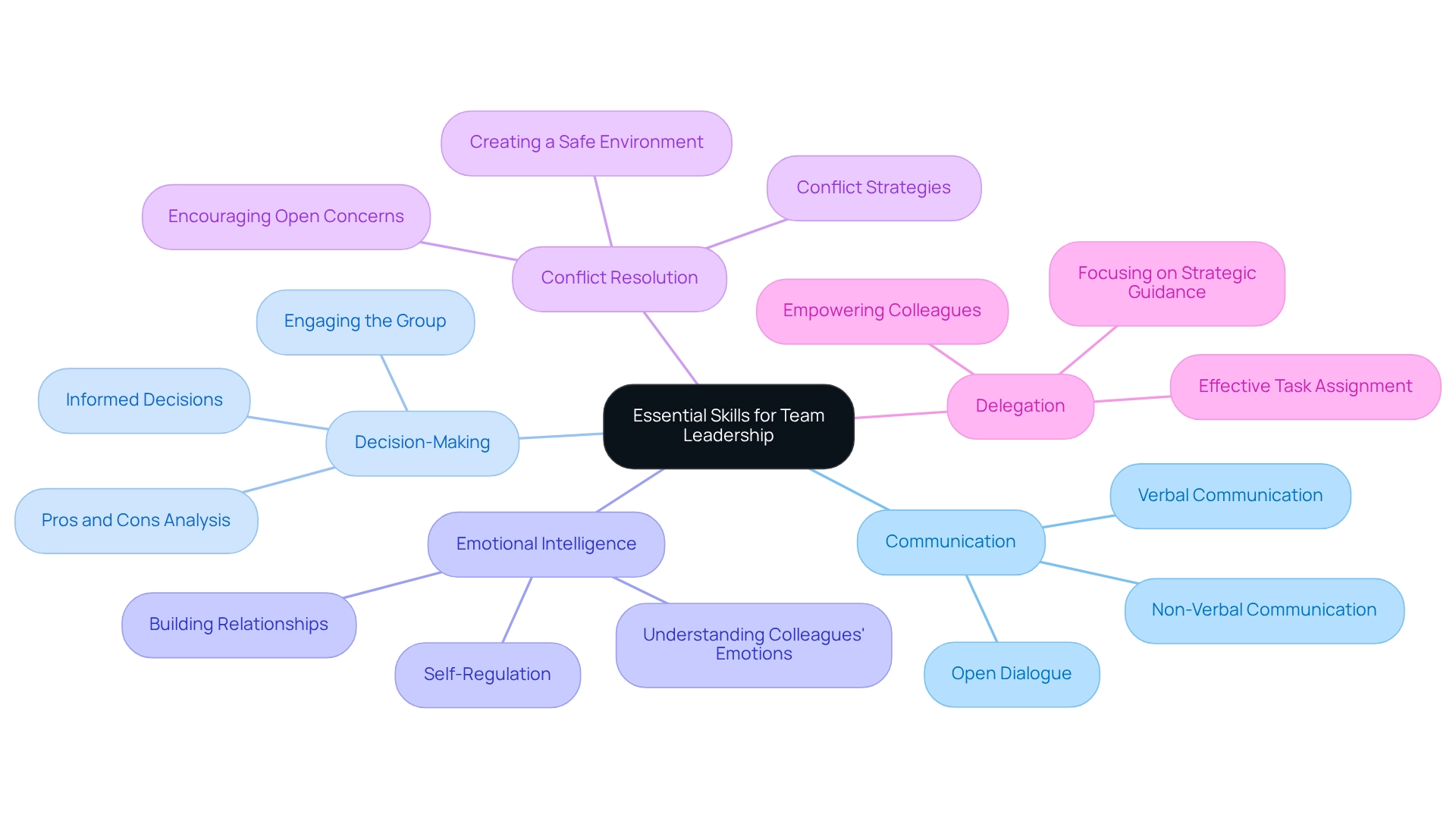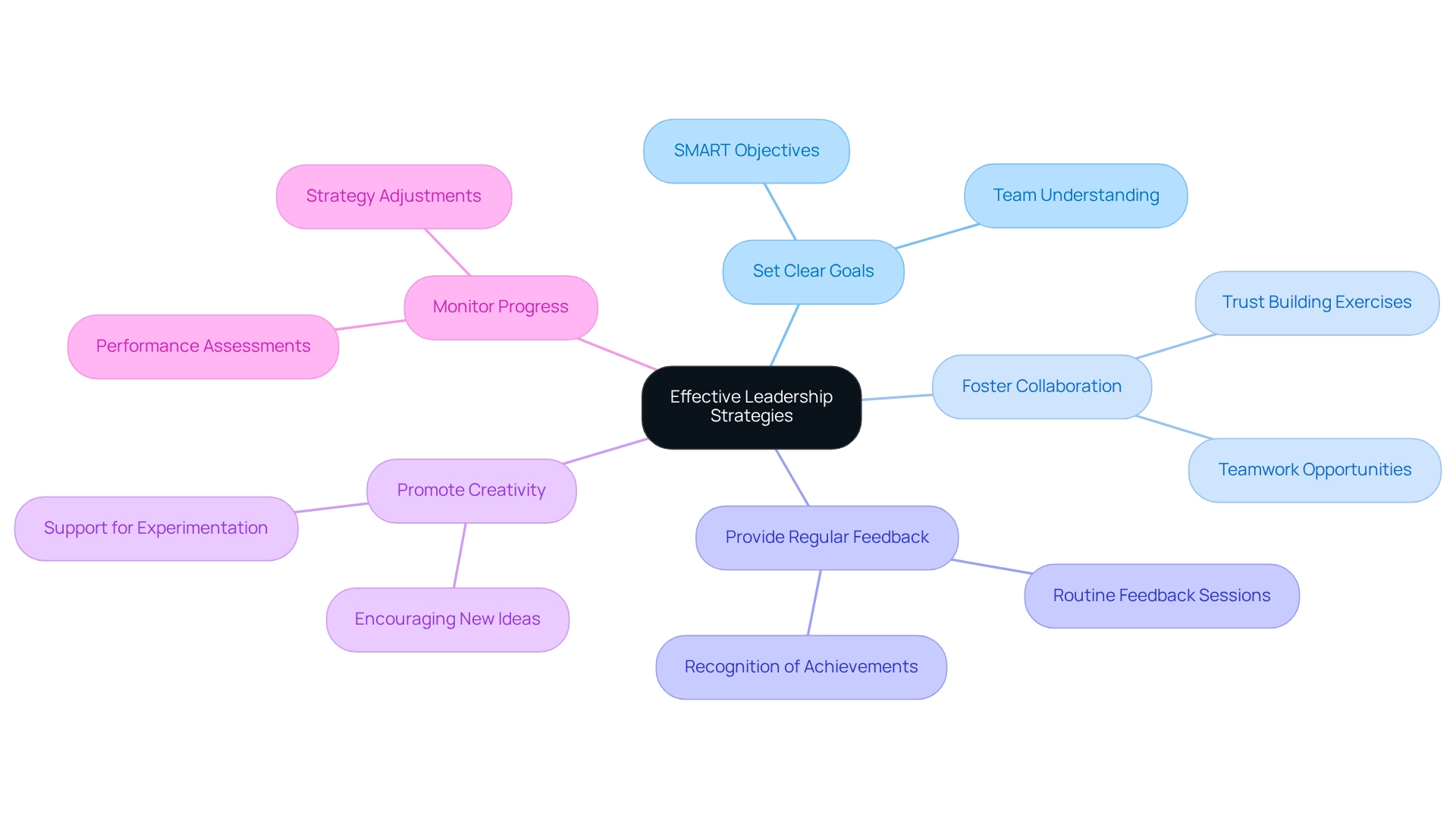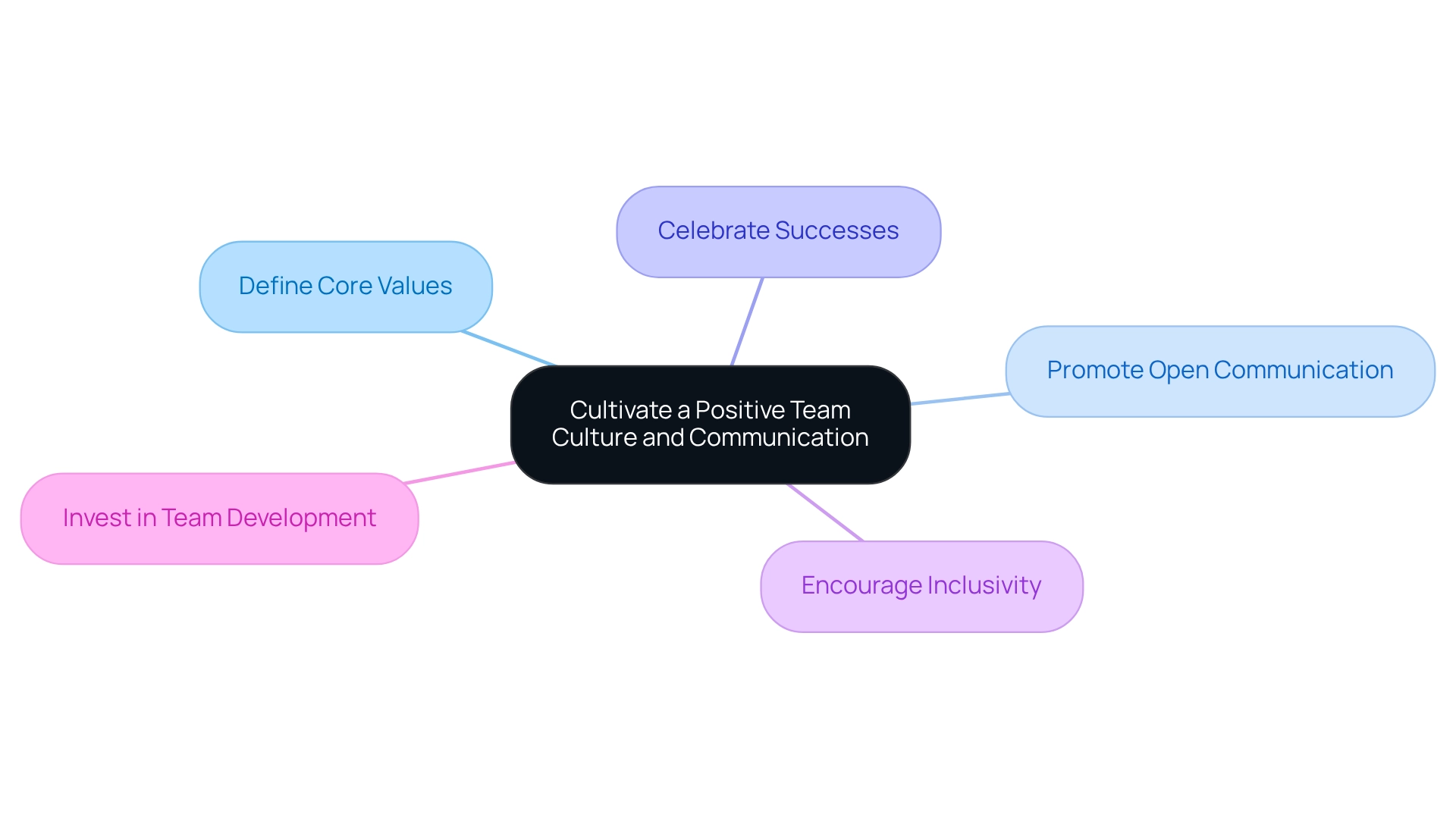Overview
To achieve success as a team leader, it is imperative to cultivate a growth mindset and develop essential skills such as communication, emotional intelligence, and conflict resolution. This article elucidates specific strategies that support this endeavor, including:
- The establishment of SMART goals
- The encouragement of open feedback
- The fostering of a positive team culture
Collectively, these strategies enhance leadership effectiveness and bolster team cohesion, ultimately positioning the leader as a pivotal force in driving team success.
Key Highlights:
- Cultivating a growth mindset is essential for successful team leadership.
- Adopt a positive attitude by viewing challenges as growth opportunities.
- Encourage open feedback to foster a culture of improvement and openness.
- Regular self-reflection helps identify areas for personal development.
- Resilience is crucial; learn to recover quickly from setbacks.
- Promote continuous learning within the team through resources and training.
- Develop essential skills, including communication, decision-making, emotional intelligence, conflict resolution, and delegation.
- Set SMART goals to ensure clarity and direction for the team.
- Foster collaboration and trust through team-building exercises.
- Provide regular feedback to recognize achievements and address improvements.
- Encourage creativity and innovation by supporting new ideas and experimentation.
- Monitor team progress and adjust strategies to meet objectives.
- Define core values to guide team operations and decision-making.
- Promote open communication through regular check-ins and meetings.
- Celebrate successes to boost morale and reinforce team cohesion.
- Foster inclusivity by valuing diverse perspectives and ensuring all voices are heard.
- Invest in team development through training and opportunities for skill enhancement.
Introduction
In the ever-evolving realm of team leadership, the capacity to inspire and guide others stands as a fundamental pillar of success. Effective leaders not only confront challenges head-on but also cultivate an environment where growth, collaboration, and innovation can flourish.
By adopting a growth mindset and refining essential skills—such as communication and emotional intelligence—leaders can adeptly navigate their teams toward the achievement of collective objectives.
Focusing on the development of a positive culture and fostering open communication clarifies the pathway to effective leadership, empowering teams to ascend to new heights together.
Embrace the Mindset of a Successful Team Leader
To learn how to be a successful team leader, it is essential to cultivate a growth mindset. This entails:
- Adopting a Positive Attitude: Embrace challenges as opportunities for growth. When faced with obstacles, focus on solutions rather than problems.
- Being Open to Feedback: Encourage group members to offer constructive criticism. This not only enhances your management abilities but also demonstrates how to be a successful team leader by fostering a culture of openness.
- Practicing Self-Reflection: Regularly evaluate your leadership approach and its impact on your group. Identify areas for improvement and set personal development goals related to how to be a successful team leader.
- Staying Resilient: Understand that setbacks are an integral part of the journey. Learn to bounce back swiftly and maintain your group’s morale during challenging times.
- Encouraging a Learning Environment: Promote continuous learning within your group. Share resources, recommend training, and celebrate learning achievements.
Develop Essential Skills for Team Leadership
To learn how to be a successful team leader, it is crucial to develop the following essential skills:
-
Communication: Master both verbal and non-verbal communication. Ensure clarity in your messages and promote open dialogue among your group.
-
Decision-Making: Learn to make informed decisions quickly. Consider the advantages and disadvantages, and engage your group in the decision-making process when suitable.
-
Emotional Intelligence: Develop the capability to comprehend and regulate your feelings and those of your colleagues. This skill enhances relationships and fosters a supportive work environment.
-
Conflict Resolution: Equip yourself with strategies to address and resolve conflicts effectively. Promote an environment where individuals feel secure to voice their concerns.
-
Delegation: Learn to delegate tasks effectively. Have confidence in your colleagues with duties, which empowers them and enables you to concentrate on strategic guidance.
Implement Effective Leadership Strategies in Your Team
To implement effective leadership strategies, consider the following essential elements:
- Set Clear Goals: Clearly define specific, measurable, achievable, relevant, and time-bound (SMART) objectives for your group. It is crucial that everyone understands how to be a successful team leader in order to achieve these objectives.
- Foster Collaboration: Promote teamwork by creating opportunities for collaboration. Utilize collaborative exercises to enhance connections and build trust among group participants.
- Provide Regular Feedback: Establish a routine for giving and receiving feedback. Recognize achievements and promptly address areas for improvement.
- Promote Creativity: Create an environment where members feel comfortable presenting new concepts. Support creative thinking and experimentation to drive innovation.
- Monitor Progress: Regularly assess group performance against established objectives. Adjust strategies as necessary to stay on track and achieve the desired outcomes.
Cultivate a Positive Team Culture and Communication
To cultivate a positive team culture and enhance communication, consider the following strategies:
- Define Core Values: Clearly articulate the values that guide your group. Ensure that these values are reflected in daily operations and decision-making.
- Promote Open Communication: Encourage group members to share their thoughts and ideas freely. Implement regular check-ins and group meetings to facilitate dialogue.
- Celebrate Successes: Recognize both individual and group achievements. Celebrating milestones boosts morale and reinforces a sense of belonging.
- Encourage Inclusivity: Foster an inclusive environment where diverse perspectives are valued. Ensure that all group members feel acknowledged and valued.
- Invest in Team Development: Provide opportunities for professional growth through training and development programs. Support your team in acquiring new skills that enhance their contributions.
Conclusion
The journey to becoming an effective team leader is fundamentally anchored in cultivating a growth mindset, developing essential skills, and implementing strategic leadership practices. By adopting a positive attitude and embracing challenges, leaders can create an environment that encourages feedback and continuous learning. This mindset not only enhances individual leadership capabilities but also promotes a culture of openness and resilience within the team.
Effective communication, emotional intelligence, and strong decision-making skills are vital for navigating the complexities of team dynamics. Leaders must prioritize conflict resolution and delegation to empower their team members, ensuring that everyone feels valued and capable of contributing to collective goals. Setting clear, achievable objectives and fostering collaboration are essential strategies that drive team success.
Moreover, cultivating a positive team culture is crucial for maintaining high morale and productivity. By defining core values, promoting open dialogue, and celebrating successes, leaders can create an inclusive environment that respects diverse perspectives. Investing in team development through training and professional growth opportunities further solidifies a foundation for innovation and collaboration.
Ultimately, successful team leadership hinges on the ability to inspire and guide others while fostering an environment ripe for growth and achievement. As leaders embrace these principles, they not only elevate their teams but also pave the way for lasting impact and success.
Frequently Asked Questions
What is the importance of cultivating a growth mindset for team leaders?
Cultivating a growth mindset is essential for team leaders as it helps them embrace challenges, focus on solutions, and continuously improve their leadership skills.
How can a team leader adopt a positive attitude?
A team leader can adopt a positive attitude by viewing challenges as opportunities for growth and concentrating on finding solutions instead of dwelling on problems.
Why is being open to feedback important for a team leader?
Being open to feedback is important as it encourages constructive criticism from team members, enhances management abilities, and fosters a culture of openness within the team.
What does self-reflection involve for a team leader?
Self-reflection involves regularly evaluating one’s leadership approach and its impact on the group, identifying areas for improvement, and setting personal development goals.
How should a team leader handle setbacks?
A team leader should stay resilient by understanding that setbacks are part of the journey, learning to bounce back quickly, and maintaining the team’s morale during challenging times.
What strategies can a team leader use to encourage a learning environment?
A team leader can promote continuous learning by sharing resources, recommending training opportunities, and celebrating learning achievements within the group.






